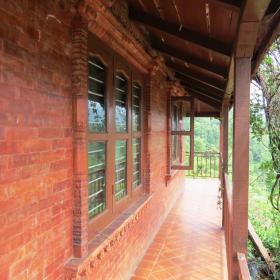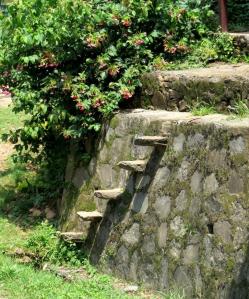As thunder rumbled reverberating through the valley and lightening speared the misty clouds surrounding our guesthouse, we watched a pair of Spangled Drongos preform a courtship dance, midair.
We had decided to leave our larger backpacks in Pokhara and spend a few days in the Begnas and Rupa Lake area. It was a nature–lovers’ dream location. Mountain Macaques leapt from branches and a squirrel scurried down a nearby tree trunk. Up there, looking out over the rainy lake, moss and lichen-clad branches supported orchards dripping with the latest shower. The hillside breathed with a soul invigorating freshness. Our room was on the upper level, a corner room with wrap around veranda and huge views. Hans would sit watching stacked clouds rush up the valley and obscure the snowy mountains as he played his harmonica. The roof-top with its 360 degree vista gave Burney her first sighting of a White-rumped Vulture soaring the thermals above terraced hills, farmlets and flat pastoral plains. Our immediate “backyard” full of fruit trees and flowering scrubs echoed with Barbets and Drongos calling.
After Burney’s day visit to Bergnas Lake and further research, we found a guesthouse on the ridgeline above the neighbouring Rupa Lake. The hosting family lived on the ground floor level. An extended family that with each day grew more familiar and welcoming. Hans entertained us with his music and we taught the toddler English childrens’ songs both in the sunny garden and in their private sitting room. In the space of 48 hours we had experienced bright sunshine, dreadful claps of thunder, misty shrouds and patchy skies but one thing remained constant: clean cool air. Oh and bird calls.
Taking a rough footpath from our lodgings, we skirted a razorback spine into a lush forest. Few people were seen except locals carrying woven work baskets on their backs, each with the single carrying strap straining against their foreheads as they leaned into the incline. In a shady clearing, a large fig tree bright with ripe red fruit and a recent hatching of white moths had the birdlife active. We lingered enjoying our first clear sighting of a Great Barbet, a Long-tailed Broadbill and the cackling of a group of White-crested Laughing Thrush. So many wonderful moments whipping our binoculars’ focus from branch to branch as birds seldom remain still. The birdlist grew as did the number of new birds to study and identify back at the guesthouse. Unfortunately, the owner was away visiting family. He was an avid birdwatcher and would have been a great asset identifying mystery raptors and fleeting glances of rushing feathers.
That evening after requesting fresh fish from the local lake, we all enjoyed a couple of meals that didn’t involve chicken or Dal Bpat. When we were leaving for our early morning walk that day, we had passed 3 men each carrying several different fish. The request must have been relayed down the hillside at the crack of dawn. They had scaled the steep hillside to present their catch to our cook. Whatever she had decided, it was a lovely change. (Burney thought that if she ate any more chicken, she would start laying eggs.)
May 31st saw us bidding the Annapurnas farewell. We had returned to Hotel Trekkers Lodge and been welcomed liked family. Such good people and caring proprietors. We asked their assistance in booking a coach to Kathmandu. Burney was prepared to pay for a more expensive deluxe coach, no more local buses, thank you. The journey of 200kms would follow the Prithvi Highway, a “better” road. Hans opted to gamble on a less expensive option as suggested by the hotel management, $7.50 as opposed to $25. “Let it be on both your heads if it turns into another rodeo” Burney warned the men with arched eyebrow. The next day, in a vast unsealed allotment several gaudy coloured buses filled the Tourist Bus Park. Inspecting our transport, Burney conceded that it looked quite comfortable considering the legroom and seat size and it was air-conditioned. While we waited for the departure time to tick around hawkers carried trays of freshly baked pastries and long vertical sections of cucumber. Then like a festival parade several people with instruments came singing “ Hari Krishna, Krishna Rama hari hari” and exited with a trail of devotees in their wake.
The 7.5 hour trip went very well along reasonably well bituminised roads that wound around the ranges. Burney had to think about the engineering and hard labour that went to into building the Prithvi Hwy and the Tibetan contribution. Then, as now, most rocks were carried by women on their heads and hammered into road-base chips with basic hand tools. It was as we were approaching the outskirts of Ktm city that everything came to a brake-squealing halt. And there was that powder fine dust, again. We assumed it was roadworks, although it was impossible to know as the road wound through a crumbling township with traffic banked fore and aft of our sight. Grit snuck into the bus as we occasionally inched toward piles of sand, mounds of gravel and broken concrete that bordered the street. Shopfront windows grimly protected some goods while other items lay under a patina of greyness which the proprietors beat with long haired brushes in a futile effort to remove the dust only to watch it resettle on their merchandise later. Several structures wore great rents in their facades, others had lost complete walls exposing stairwells and now empty rooms. Yet others remained complete. We were seeing remnants of the earthquake damage that had killed and injured many. (Over 9,000 lost their lives, 17,866 were injured.) The vast majority of survivors still struggled to rebuild their lives. Over 300,000 houses were destroyed and another 292,000 damaged. World financial support had too often disappeared into pockets of politians and middlemen or lay in government coffers.
Gone was the shining luster of long black hair and pristine saris. Here everyone wore their grey mantel like a uniform of dust over dirty faces and feet. Some attempted to protect themselves with face masks or scarves covering all but their squinting eyes. Young boys and women hoisted shovels like professional construction workers. If they wanted a home, they obviously had to do it themselves. There was no indoor plumbing, women and children carried water urns and plastic containers to communal irrigation pipes. Some even bathed there partially clothed. We had much for which to be grateful, yet often grumbled while they were quick with a smile and a heart felt “Namiste”.
By 4.30 pm long after our scheduled arrival time the bus driver’s assistant came looking for us…?
We had a telephone call?
It was our lovely hotel owner from Trekkers Lodge checking that we had arrived in Kathmandu, safely.
It was obvious from Hans’ body language that he was reassuring our caller that Burney was indeed fine and although we were delayed did not hold him responsible.
Wow, that was beyond the call of duty!
We were finally deposited in the narrow streets of the Thamel district of Ktm, again. Back to the city of contrasts where small cars and noisy motorbikes competed with wooden carts. A city of 2.8 million residents who shared crumbling old streets and ancient architecture with high-rise hotels, where cows lay dozing in the middle of busy thoroughfares and street dogs were loved by all.
















